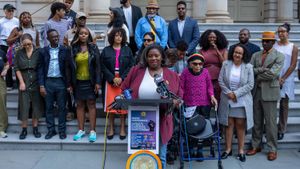Sir Keir Starmer, the Prime Minister of the UK, is standing firm against calls for changes to his government’s recent Budget, which introduced significant adjustments to inheritance tax, particularly affecting farms. The controversy surrounding these tax changes has sparked considerable debate, especially among farmers who feel the adjustments could threaten their livelihoods.
Starmer’s defense of the changes came on the heels of rising tension within the agricultural community, who argue the new tax structure will impose severe burdens. Farmers have voiced their concerns over the inheritance tax being applied to farms valued over £1 million, saying the figures provided by the government do not align with their realities.
During his visit to North Wales, Starmer attempted to clarify the tax's impact by stating, “What I would say about this is, once you add the £1 million for the farmland to the £1 million exempt for your spouse, for most couples with a farm wanting to hand on to their children, it's £3 million before anyone pays a penny in inheritance tax.” This declaration indicates he believes the majority of farms won’t be adversely affected by these tax changes.
Despite Starmer's reassurances, farmers have countered with data from the Department for Environment, Food and Rural Affairs, indicating approximately 66 percent of farm businesses are valued over the £1 million mark, opposing the Chancellor's claims from the Treasury which suggested three-quarters of farmers would incur no inheritance tax.
Protests have mobilized farmers across Wales, with significant demonstrations planned to coincide with the Welsh Labour Conference. Farmers are projected to gather on tractors, symbolizing their dissatisfaction and concerns. Gareth Wyn Jones, a prominent Welsh farmer, encapsulated the feeling among the farming community, stating, “They’re destroying an industry that's already on its knees and struggling.” His comments echoed the sentiments of many within the agriculture sector who are advocating for government support rather than increased financial obligations.
At the Welsh Labour Conference, Starmer proclaimed the £21 billion Budget allocation is unprecedented and is indicative of Labour's commitment to revitalizing the Welsh economy. “I will stand behind the difficult choices we’ve made for the greater good,” he affirmed during his address.
Starmer also emphasized the importance of “fixing the foundations of our economy” and maintaining Britain’s financial stability, adopting language reminiscent of political rhetoric aimed at unifying his party’s vision. He highlighted the need for labor reforms to stabilize the economy and improve public services, true to the longstanding Labour party principles.
Yet, criticisms from various sectors, including charities and healthcare providers, are burgeoning. The Budget, which includes £40 billion of tax increases, has faced backlash as various groups demand reassessments of certain taxing measures. Even within the Labour party, there are mounting calls for Starmer to reconsider the austerity measures implicit within the Budget.
Starmer is determined to maintain the spotlight on the Budget as part of Labour’s larger narrative to bring about “national renewal.” He suggested future generations would appreciate the tough decisions made now to secure economic stability. He added, “Make no mistake, I will defend our decisions in the Budget all day long.” This stance is indicative of Starmer’s resolve to project strong leadership amid controversy.
Suspicions persist about the government’s calculations on inheritance tax, especially as farmers plan extensive actions to communicate their dissatisfaction with the decision-makers. Protests scheduled include large gatherings outside the Prime Minister’s office, with symbols such as tractors reinforcing the agricultural sectors' plight.
Starmer's reiterated commitment to certain sectors of society challenges growing public discontent over perceived financial inequities. Farmers, who contribute significantly to Britain's food supply, express fears of losing their legacy and ability to provide for future generations.
Others, like the National Farmers’ Union (NFU), are seeking clear communication and dialogue with the government to rectify any misconceptions about the tax policy and its impact on family farms. They argue the inherited farm structures are often not just businesses but also homes and heritage sites.
On his agricultural reform agenda, Starmer plans to introduce new initiatives, including support for sustainable farming practices and investment zones, aiming to bolster farming productivity. This move is seen by some as heeding the protests and concerns expressed by rural communities.
The protests planned for London rally significant support from farmers and also aim to engage national media attention, potentially influencing voter sentiments as general elections approach. The outcome may determine whether the Labour party’s current strategies resonate with the electorate or if the tensions escalate beyond the confines of parliamentary debate.
Through these events, Starmer finds himself at the crossroads of farming and fiscal policy, where the stakes involve not just party unity but also the agricultural backbone of the nation. He must navigate the fine line between implementing necessary fiscal policies and preserving the integrity and viability of UK farming.
Farmers and allies will continue to speak out, urging the government to understand the realities of today’s agricultural climate. Their message remains clear: sustainability and support must align with fiscal policies if the UK is to support its farmers and the wider community they serve.
With the backdrop of mass protests and fervent debate, this chapter of Starmer's leadership stands out as pivotal. Will he reshape the discourse around inheritance tax, or will it drive divisions not only between politics and agriculture but within his own party?
Only time will tell as both sides prepare for what is shaping up to be not just debates, but confrontations about the future of farming and fiscal accountability within the UK.



